The Meaning of Care Magazine
Community Health Clinic Dedicated to Meeting Patients' Evolving Needs
Published: Nov. 25, 2019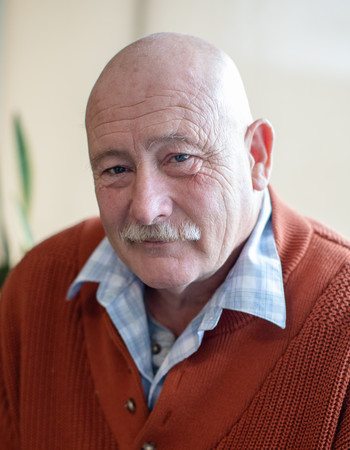
The arborist is used to working hard, caring for trees and running his own lawn care business. Even after selling his company, he hasn’t had a problem finding work during the warmer months. Getting health insurance as a seasonal worker, however, is a different story.
“It’s just harder and harder, especially as you get older, to get insurance,” the 59-year-old said.
As he’s dealt with health issues including diabetes, a recent broken collarbone and mental challenges, he’s found care and support at a growing clinic dedicated to helping people just like him.
A Powerful Partnership
The Methodist Community Health Clinic moved in 2017 from Midtown Omaha to 26th Avenue and Douglas Street on the west end of downtown. It’s part of the Kountze Commons partnership, in which Kountze Memorial Lutheran Church, Lutheran Family Services (LFS) and Methodist Health System have come together to provide health care, food assistance and social services to people in need.
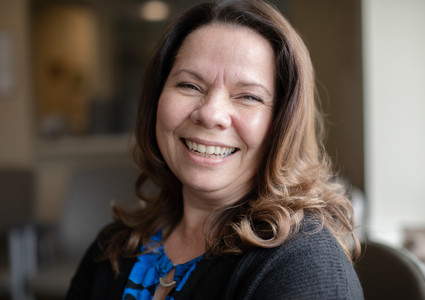
At the Healing Gift Free Clinic at Kountze Commons, people have access to services provided by volunteer medical professionals. The Kountze Memorial Lutheran Church Food Pantry feeds over 400 people each Monday. And at the Community Health Clinic, it’s about breaking down the barriers to care.
The clinic and its staff are up to the challenge. Support from Methodist Hospital, Methodist Hospital Foundation, grants and government programs helps keep costs low for patients. The clinic is strategically located close to major roads, bus lines and other services accessed by the population it serves. When patients arrive, building relationships is paramount.
“We’re not a typical office with a 15-minute visit,” Clements said. “We have a little more time to allow for trust-building, explanation and education.”
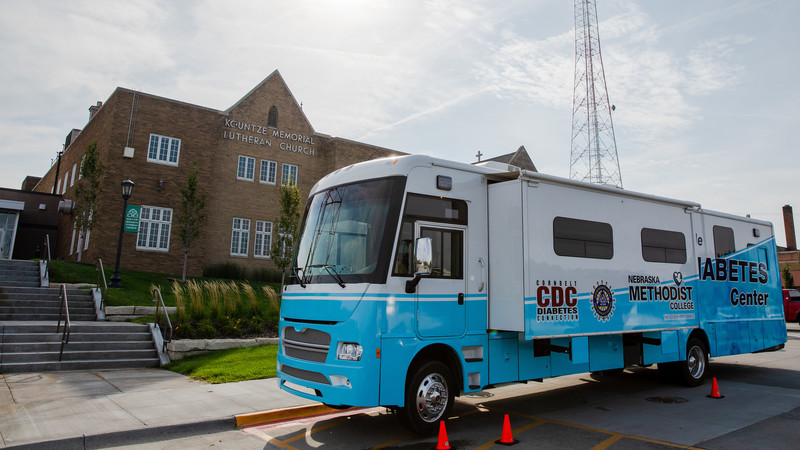
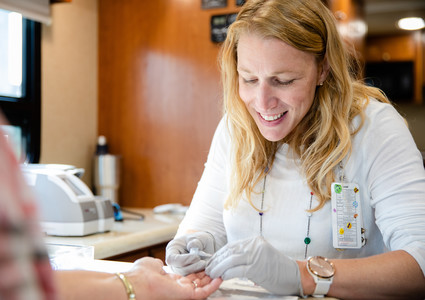
On the other side of Kountze Commons, another Methodist initiative is helping those in need. Once a month, Nebraska Methodist College’s Mobile Diabetes Center parks outside the Kountze food pantry.
“We realized there are a lot of other issues that the clients here at the food pantry face, so we thought, how can we bring services to them?” said Mike Kraus, Methodist’s community commitment coordinator.
As people wait to access the food pantry, Kraus and health system volunteers offer information on monthly topics such as heart disease, nutrition and sexual assault awareness. Methodist experts have performed free head and neck cancer screenings, and Kraus hopes to bring Methodist’s Mobile 3D Mammography coach soon.
Meanwhile, anyone can climb aboard the diabetes coach for a free blood sugar test and health screening from volunteer nursing professionals and students from Nebraska Methodist College. In the fall, free flu shots are available.
It can be a tough sell, Kraus said. Trust is a factor. While hundreds may enter the food pantry, usually about 20 will visit the diabetes coach. Just like at the Community Health Clinic, the goal is for quality interactions tailored to each patient.
“We bridge that gap just by being consistent, caring and compassionate,” Kraus said. “We are living The Meaning of Care here. I think it means a lot to them.”
An “Equal Playing Field”
Methodist’s efforts are working. The Community Health Clinic is on pace to see 2,800 patients this year, up about 800 from 2017. They include downtown workers and residents, immigrants, and the homeless. Some patients come from as far as North Platte, Norfolk and western Iowa. That diversity highlights the need that exists in the region, Clements said.
“Without a clinic like this, these patients would not have as much of an opportunity to develop a healthy lifestyle and have disease prevention,” she said. “The clinic gives them an equal playing field.”
The increase in patients can be attributed to the changing needs of the community as well as an expansion of services. The clinic has always provided primary care services that include physical exams, treatment of minor illnesses and chronic disease management. It also has Sexual Assault Nurse Examiners trained to provide follow-up care for victims of sexual assault.
Since 2018, new services making a difference for patients include nephrology, electrocardiograms, pulmonary function tests and legal aid. Methodist providers also work closely with the Healing Gift clinic, referring patients for free orthopedic and dermatology services.
Perhaps the most important addition, Clements said, is a behavioral health collaboration with LFS. About one-third of the Community Health Clinic’s patients have a mental health diagnosis.
Jillian Reitz, PLMHP, an LFS behavioral health consultant, spends three days a week in the clinic working with patients on issues like depression and anxiety. She also assists with lifestyle changes tied to smoking cessation, diabetes and other conditions – anything that can benefit a patient’s overall health.
“We recognize the connection between mind and body, and how these two can affect each other,” she said. “Behavioral health has to be part of that integrated whole health care. That’s the vision.”
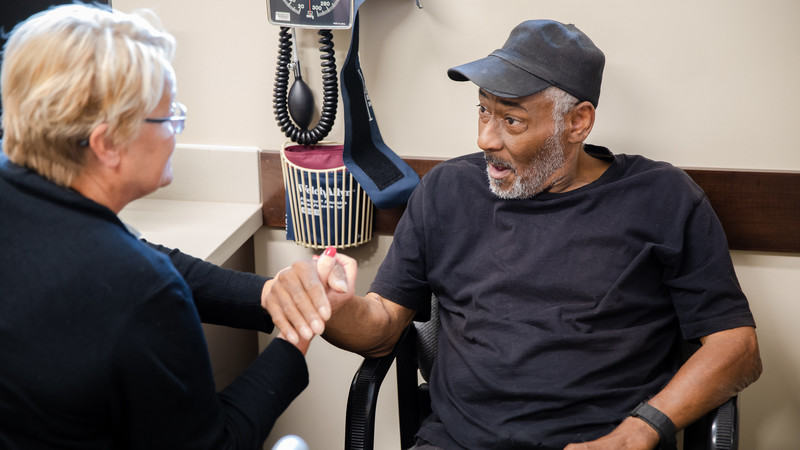
Like Lee, Edward Jackson, 65, has seen life’s ups and downs.
He lost his job in 2011 and lived out of his truck for a few years. During that time, the Healing Gift clinic helped him get the medication he needed to control his diabetes. A stroke in 2016 set his health back again.
“I was expecting and hoping and praying that I’d be working until I was 75,” he said, “but it isn’t working out that way.”
Edward began collecting Social Security and moved into an affordable housing complex for seniors. Even as he got back on his feet, he still needed help.
He began visiting the Community Health Clinic, where he quickly formed a bond with the “great, great nurses there.” And last year he started seeing Dr. Richard Lund, a nephrologist with Omaha Nephrology who volunteers his time to help patients with kidney issues.
This summer, Edward’s kidneys failed. Dr. Lund eased the transition into dialysis treatments.
Through all his challenges, Edward has kept a positive attitude. He’s full of smiles and conversation when he visits the Community Health Clinic.
“I’ve got to smile on life because I’ve enjoyed life,” he said.” Whatever happens, I’ve just got to adapt to the changes.”
That said, he owes a debt of gratitude to the clinic and its staff.
“If it hadn’t had been for the clinic, I don’t think I’d be here,” he said.
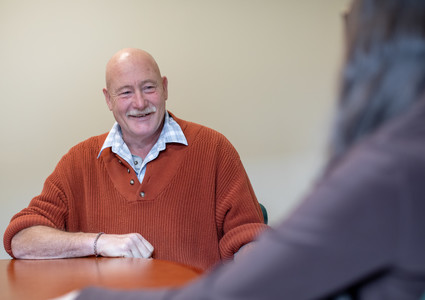
Commitment to Care
Lee initially went to the Community Health Clinic for assistance in getting his diabetes under control. But his time with Reitz has proven just as valuable.
“Even the best of people who are on a high most of the time still go through a cycle where they go down,” Lee said. “It does help to talk to somebody. She helps reset your compass.”
Said Reitz: “Sometimes you just need that little booster shot. Sometimes you just need that extra push or extra cheer to get you where you need to be.”
Whether it’s offering coping strategies or just listening, Reitz is a key part in the clinic’s approach to bringing services to the patient. The effort has come a long way in two years, but there’s work to be done. One thing Clements knows is that the clinic is committed to serving the community as its needs evolve.
“The new clinic gave us so many opportunities to grow. And we have,” she said. “And I believe we’re going to continue to add. This clinic and this area, this size and location, it just really makes that possible. Our partnership with Kountze Memorial Lutheran Church and Lutheran Family Services makes that possible.”
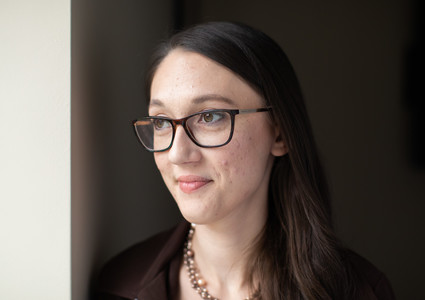
More Resources
- Learn more about Methodist Health System's involvement in the community
- Read more from the Winter 2019 issue of The Meaning of Care Magazine


